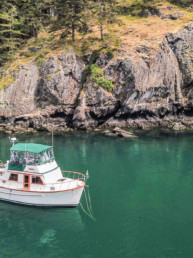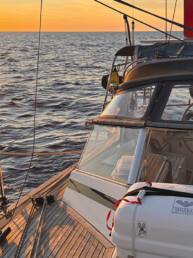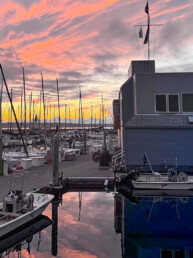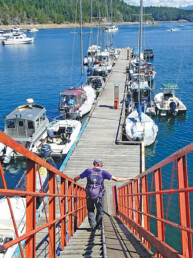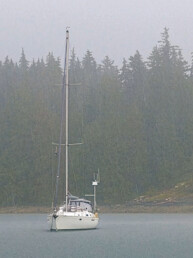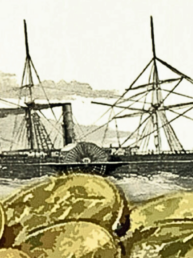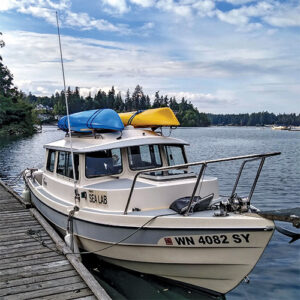
Tekla, our friend Rob, and I were hanging around the house on a Thursday afternoon, as retired folk sometimes do, when the suggestion to hit the water came up and was accepted all around with instantaneous enthusiasm. Rob called his wife Tracy to come along, and we all headed down to our C-Dory 22 cruiser, Sea Lab. With the boat newly relocated closer to home, we were pulling out of the slip inside of 20 minutes from the inception of the idea.
Our inspiration had been Tekla’s check of the Orca Network and the resulting discovery that a pod had recently been sighted up near Allyn. We thought it would be fun to be afloat when they passed by on their way south, observing the new rules regarding whales, of course.
We headed out toward the middle of Case Inlet and shut the engine down to drift and enjoy our surroundings and to see if the orcas would pass by. The weather was bright and sunny, but also windier than we at first thought. Soon, drifting felt more like bouncing around on whitecaps. The tide was flooding, and the wind was from the south so the chop was not terrible but not very comfortable either.
There was no spouting to be seen, so we speculated that maybe the whales had already gone south, and we decided to do the same. We resolved that Plan B was to run down to Jarrell Cove where some other friends had just moored their new-to-them Ranger Tug, so we could see it for the first time. I started the motor, and we began to mosey southward.
As we neared the southern end of Stretch Island, Rob called out to say that there was someone in a kayak waving to us and he couldn’t tell if they were being friendly or needed help, so we altered course in their direction. After looking through the binoculars it became clear that there were two kayaks and the bow of one of them was pointing up—not floating correctly. I picked up our pace to get closer, and soon we could see that one of the kayaks had capsized and the person was in the water clinging to the capsized boat and her friend’s boat so they would not become separated in the wind and waves. At this point we all knew it was an emergency, I had the crew get PFDs on and get ready.
I knew the approach would be tricky in the conditions, so I circled upwind around them and let the boat drift down upon them and, just before making contact, I cut the engine. Then, Rob took over in his calm, efficient manner and assessed the situation. A woman named Cindy had been in the water for about 10 minutes, but she was lucid and in good humor. The water temperature was 59 degrees according to my Lowrance display, so getting her out of the water was our first concern.
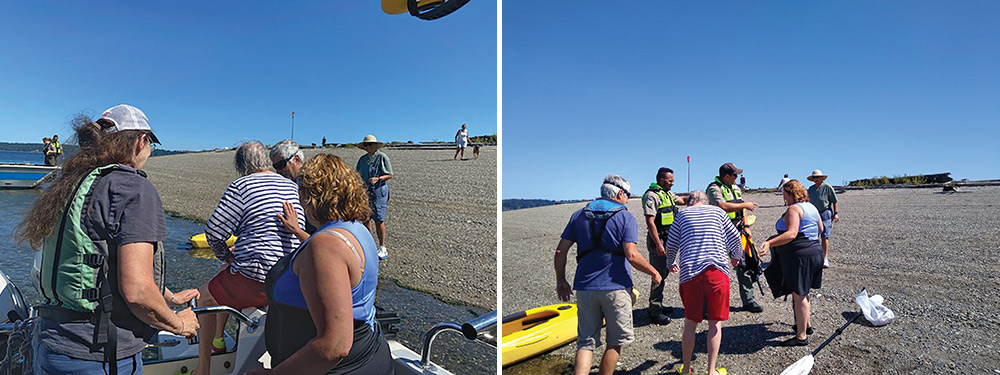
Tekla and Rob lowered the ladder on our small swim step. The second kayaker, Angelina, and Rob managed to maneuver Cindy into a position from which she could get her feet on the boarding ladder, and then we pulled her up on the swim step and had her rest there for a minute. We could all feel a palpable sense of relief as soon as she got up to the step.
After a brief rest, we got her up and over the transom and into the cabin, where we rounded up a blanket and got her situated to start the warm-up process. Next, we got Angelina to the swim step and on board, which is not the easiest of operations. Tekla has fallen into the water once trying to get on board out of a kayak, it’s a difficult move.
About this time, the Mason County Sheriff boat and the Jarrell Cove State Park boat arrived on the scene, since Angelina had called 911 and they had dispatched help. The park boat picked up the capsized kayak full of water, which we had set adrift, and found the paddle floating nearby. We started the motor again and headed toward the shore of Hartstene Pointe, which was where they had paddled from about a mile away.
I had never beached Sea Lab before, so I was a little nervous about the landing; but the beach was steep with small gravel, and we still had a rising tide. I decided it was manageable and I raised the motor as we nosed into the gravel.
The other two boats beached as well and soon we had a small crowd gathered around. After making sure Cindy was ok, the first question I heard the Sheriff ask was, “Is your life jacket Coast Guard approved?” and he wanted to inspect it to see. After all the interviewing and questioning, things seemed to be settling down. Cindy’s husband arrived and thanked us for stopping to pick her and Angelina up.
Through all of this, we learned more about what had transpired. It turned out that Angelina was visiting and they wanted to get out on the water. Cindy said they don’t usually go out at low tide, which it was when they launched, and when the tide began to flood they were much farther from the beach at Hartstene Pointe than they realized. The current and wind were pushing them away from the launch site and, when they turned around to paddle back, they could not make headway against it and became tired. They decided to tie the boats together so Angelina could tow Cindy against the resistance and, while they were arranging this, Cindy overturned and went into the water. Angelina had her cell phone and called 911, and I think that even if we had not come along the Sheriff and State Park people would have gotten to them before anyone got really hurt. Still, I was glad we were there and responded to their wave—they told us that two other passing boats had not done so.

Everything turned out fine this time, but an event like this brings home the fact that things can go wrong quickly, and a fun day on the water can turn into an adventure you didn’t expect. No matter what type of boat you have, practicing crew overboard drills provides critical skills and learning. Working through this situation showed us that it’s difficult to execute a practice drill that can match the task of getting someone out of the water in reality. It helped a lot that Cindy was alert and relatively unaffected by hypothermia when we arrived, and we were able to get her out. It gives me a shiver of recognition at how difficult that could be in other circumstances. Stay safe in your boats and upright, everybody!
Dennis, Tekla, and Tim Tim the sailor dog recently changed their home cruising waters from Tacoma to Case Inlet.
Dennis Bottemiller
Dennis and his mate, Tekla, reside in Auburn, Washington and usually launch from Point Defiance to spend time on Sea Lab, their C-Dory 22 affectionately nicknamed “Boatswagen Bus.” When not playing with boats or guitars, Dennis can be found tending tropical Rhododendrons at the Rhododendron Species Botanical Garden.

